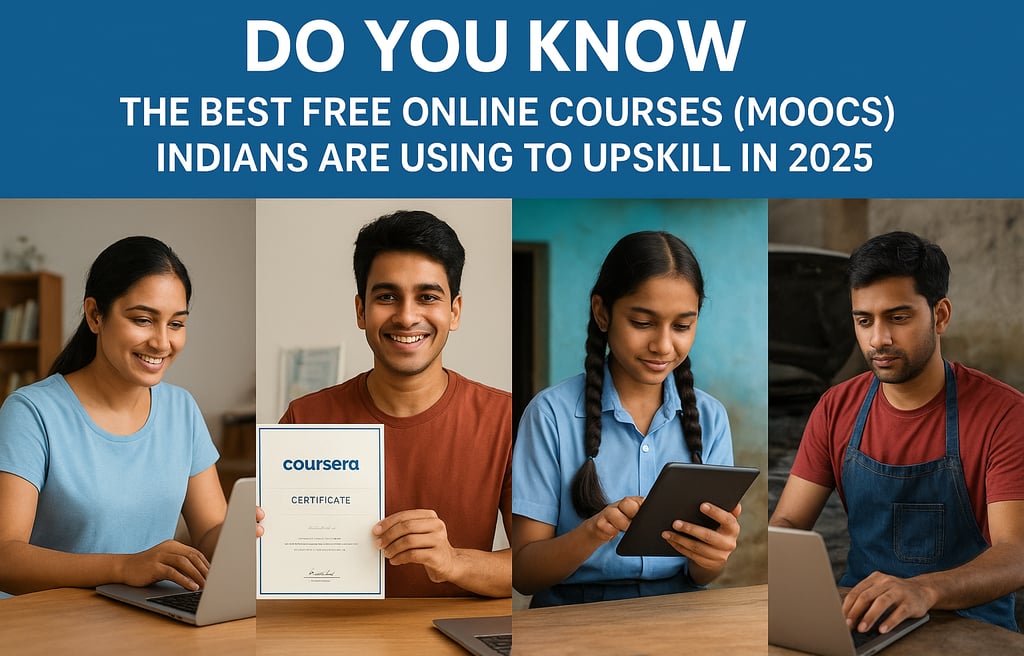Do You Know the Best Free Online Courses (MOOCs) Indians Are Using to Upskill in 2025
Discover the best free online courses (MOOCs) Indians are using in 2025 to upskill in technology, business, data science, AI, and more. Explore global and Indian platforms shaping careers.
KNOWLEDGE & EDUCATION
Do You Know Team
9/23/20255 min read


The year 2025 marks a turning point in India’s digital education journey. Once limited to classrooms and costly coaching institutes, learning today has expanded beyond physical walls. The rise of Massive Open Online Courses (MOOCs) has changed how Indians acquire new skills. Whether you are a college student in Delhi, a working professional in Bangalore, or a homemaker in Jaipur looking to re-enter the workforce, free online courses are breaking barriers and creating new opportunities.
In 2025, India has the largest youth population in the world, and the hunger for skills is unmatched. Employers are no longer just looking for degrees; they seek real-world expertise, adaptability, and digital fluency. MOOCs allow Indians to learn at their own pace, from global universities, top industry experts, and even from Indian government-backed platforms like SWAYAM and NPTEL.
But why are MOOCs so important? Simply because they make Harvard-level education accessible to an Indian village with just a smartphone and internet connection. They also help professionals keep up with fast-changing technologies like AI, blockchain, data science, fintech, cybersecurity, and green energy.
This article explores the best free MOOCs that Indians are using in 2025, their benefits, real-world impact, and what the future holds. It’s not just a list of platforms—it’s a deep dive into how free learning is rewriting India’s growth story.
1. The Rise of MOOCs in India
Online learning in India started small—mostly YouTube tutorials and private coaching apps—but by 2020, platforms like Coursera, Udemy, and edX gained traction. The COVID-19 pandemic accelerated adoption, pushing schools, colleges, and professionals to embrace digital learning.
By 2025, MOOCs are no longer just “optional learning tools.” They are now essential for career growth. A fresher with Coursera certifications on data science, a homemaker with a SWAYAM certification in digital marketing, or a factory worker upskilling through Skill India’s online modules are all part of a silent revolution.
MOOCs are popular in India for three key reasons:
Affordability: Most courses are free, with optional paid certificates.
Accessibility: All you need is internet and a device.
Employability: Companies recognize these certifications as proof of skills.
2. Coursera: Global University Access at Your Fingertips
In 2025, Coursera remains the most popular international MOOC platform in India. Courses from universities like Stanford, Yale, and IITs are available at no cost, with certificates optional.
Some of the most in-demand free Coursera courses among Indians in 2025 include:
AI for Everyone (by Andrew Ng)
Data Analytics with Python
Financial Markets (Yale University)
Google IT Support Professional Certificate
Indians particularly value Coursera because many courses are available in partnership with Indian institutes like IIT Bombay and ISB Hyderabad, making the learning experience relevant for the Indian job market.
Future implication: Coursera is increasingly partnering with Indian government initiatives to integrate certifications into Skill India programs, ensuring millions of learners get globally valid credentials.
3. edX: Ivy League Quality for Free
edX, created by MIT and Harvard, continues to attract Indian learners seeking academic rigor. In 2025, courses like Harvard’s CS50 (Introduction to Computer Science) or MIT’s MicroMasters in Data, Economics, and Development Policy are hugely popular.
Indians prefer edX when they want deep academic learning and pathways to master’s programs abroad. For example, an Indian engineer completing edX’s MicroMasters may get direct credit transfer into universities overseas.
For cost-conscious learners, auditing courses on edX is free, and that makes it a powerful equalizer.
4. Udemy: Skill-Focused Learning for Professionals
While Coursera and edX offer structured academic-style learning, Udemy thrives on practicality. In 2025, Indians use Udemy primarily for job-specific skills like:
Web development
Graphic design
Excel for business
Personal finance
Public speaking
The strength of Udemy is its peer-to-peer model, where experts (including many Indians) create courses. Many free or discounted courses are available, which makes it perfect for working professionals who want quick, actionable knowledge.
5. SWAYAM: India’s Own MOOC Revolution
SWAYAM, launched by the Government of India, is a game-changer for Indian learners. It hosts courses from IITs, IIMs, and central universities, all free of cost, with affordable certificates.
In 2025, SWAYAM is particularly popular for:
Engineering and technical courses (IIT faculty)
Management basics (IIM professors)
Arts, commerce, and humanities (Delhi University)
What makes SWAYAM powerful is that many courses are now credit-linked, meaning students can transfer MOOC credits to their degree programs. For rural students, this means world-class education without leaving their hometowns.
6. NPTEL: Engineering Students’ Favorite
NPTEL (National Programme on Technology Enhanced Learning) is run by IITs and IISc. It is a treasure chest for engineering, science, and technology students.
Popular free courses in 2025 include:
Programming in C and Python
AI and Machine Learning
Electrical Engineering Fundamentals
Civil Engineering Structures
NPTEL also has local language support, making it a lifeline for students who struggle with English. By 2025, it integrates AI-driven adaptive learning, ensuring every student gets a personalized path.
7. Skill India Digital Platform
Skill India’s new Digital Learning Hub launched in 2023 has matured by 2025 into one of the largest government-backed MOOC ecosystems. Courses are free, industry-recognized, and linked to apprenticeships and jobs.
Indians are using it for:
Digital literacy
Basic coding
Healthcare training
Green energy and EV maintenance
Entrepreneurship development
This initiative ensures that not just urban youth, but also semi-urban and rural workers, are equipped for the digital economy.
8. LinkedIn Learning: Career Growth on the Go
LinkedIn Learning (formerly Lynda.com) is heavily used by Indian professionals in 2025. While not all courses are free, many are accessible through corporate tie-ups, colleges, and free trials.
Indians use LinkedIn Learning to build portfolios in:
Project management
Data visualization with Power BI
Digital marketing strategies
Leadership and soft skills
The direct connection to LinkedIn profiles makes these certifications highly visible to recruiters, giving Indians a competitive edge.
9. FutureLearn and Khan Academy: Democratizing Global Knowledge
FutureLearn (UK-based) offers free courses in healthcare, psychology, teaching, and more, and is seeing rising popularity in India.
Khan Academy continues to be the go-to platform for school students, UPSC aspirants, and anyone needing strong math/science fundamentals. Its Hindi and regional content has made it indispensable.
10. The Future of MOOCs in India: AI, Metaverse, and Beyond
By 2025, MOOCs are not just video lectures. AI tutors, interactive simulations, AR/VR classrooms, and metaverse learning hubs are making education immersive and personalized.
For Indians, this means:
Learning AI-driven coding in virtual labs
Practicing medical surgeries in VR simulations
Joining global classrooms in the metaverse alongside students from 20+ countries
The future is not just about certificates—it’s about skills that are job-ready and globally competitive.
FAQ:
Q1: Are free online courses really useful for jobs?
A: Yes, employers in 2025 actively recognize MOOCs as proof of skills. Many job postings list Coursera, edX, or SWAYAM certifications as desirable.
Q2: Which MOOC platform is best for Indian students?
A: For academic depth, SWAYAM and NPTEL are best. For global exposure, Coursera and edX are top choices. For job-ready skills, Udemy and LinkedIn Learning are most effective.
Q3: Do I need to pay for certificates?
A: Most platforms let you audit courses free. Certificates are optional but add value to resumes. Some government schemes cover certification costs.
Q4: Can rural Indians access MOOCs easily?
A: Yes, thanks to rising smartphone penetration, low-cost internet, and platforms like SWAYAM offering regional language courses.
Q5: What future trends should learners prepare for?
A: AI-powered adaptive learning, metaverse classrooms, and job-linked certifications will dominate the future of MOOCs in India.
Conclusion
MOOCs in 2025 are not a luxury—they are a necessity for every Indian seeking growth. From SWAYAM to Coursera, from Skill India to LinkedIn Learning, these platforms are ensuring that knowledge is free, accessible, and powerful. India is transitioning from being just a consumer of global MOOCs to a leader in creating its own world-class courses. With millions of Indians enrolling every month, the country is on track to become the largest online learning hub in the world.
The message is clear: Upskilling is no longer optional, and free MOOCs are the bridge between today’s opportunities and tomorrow’s success.
#DoYouKnow #MOOCs2025 #OnlineLearningIndia #FreeCourses #DigitalIndia #SkillIndia #EducationRevolution #Upskilling #FutureOfWork #Elearning
Knowledge
Empowering minds with reliable educational content daily.
Newsletter Signup
© 2025 DoYouKnow. All rights reserved.
Stay Ahead of the Trends – Join Our Newsletter
